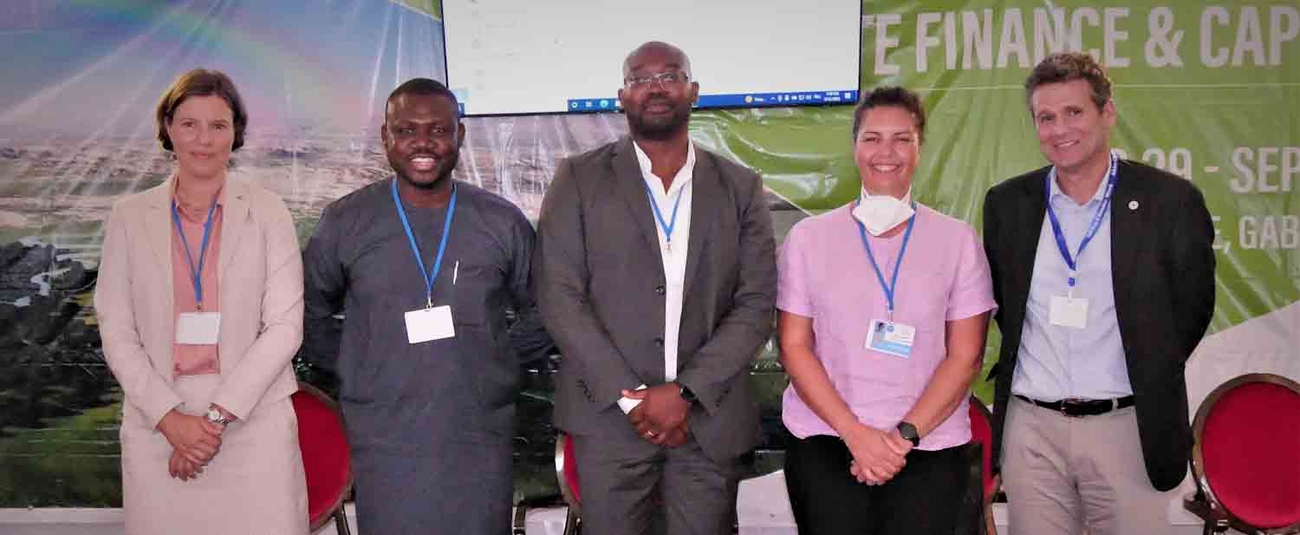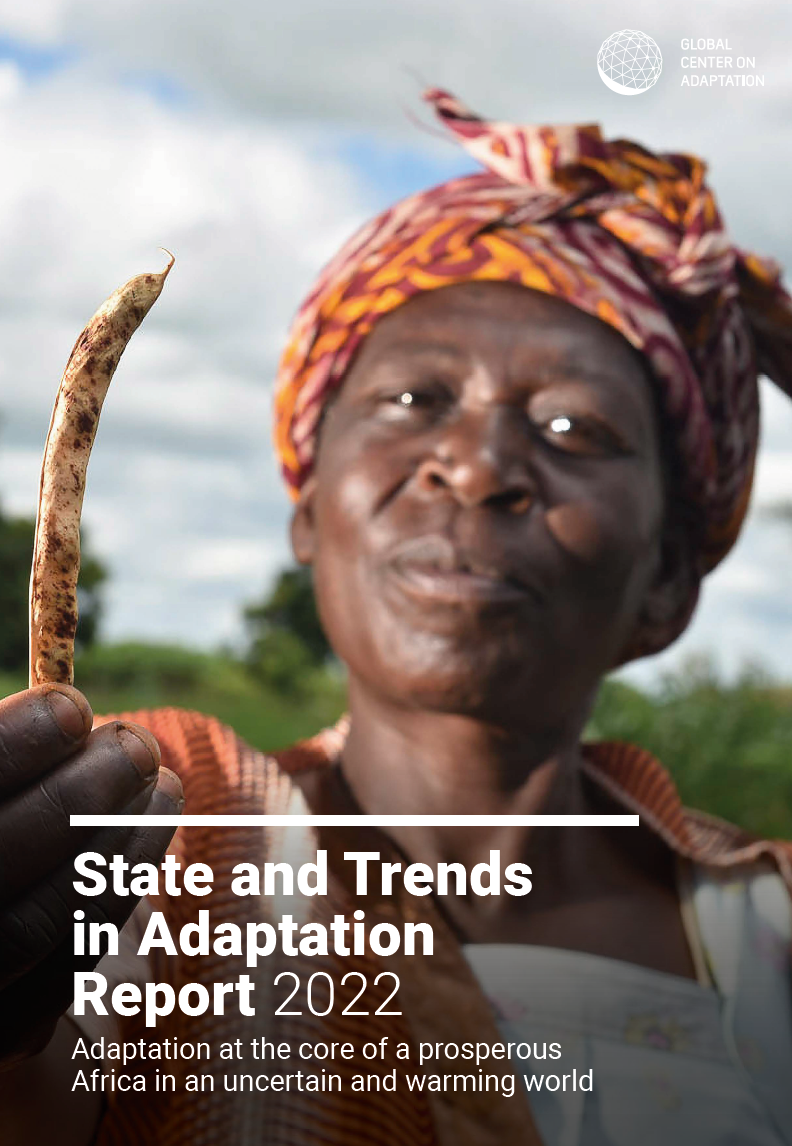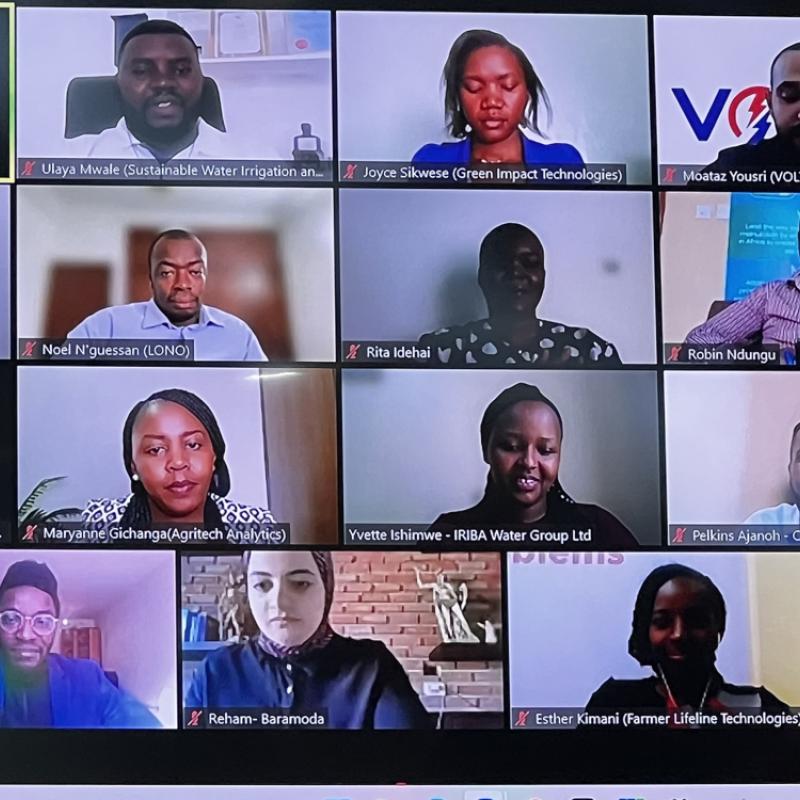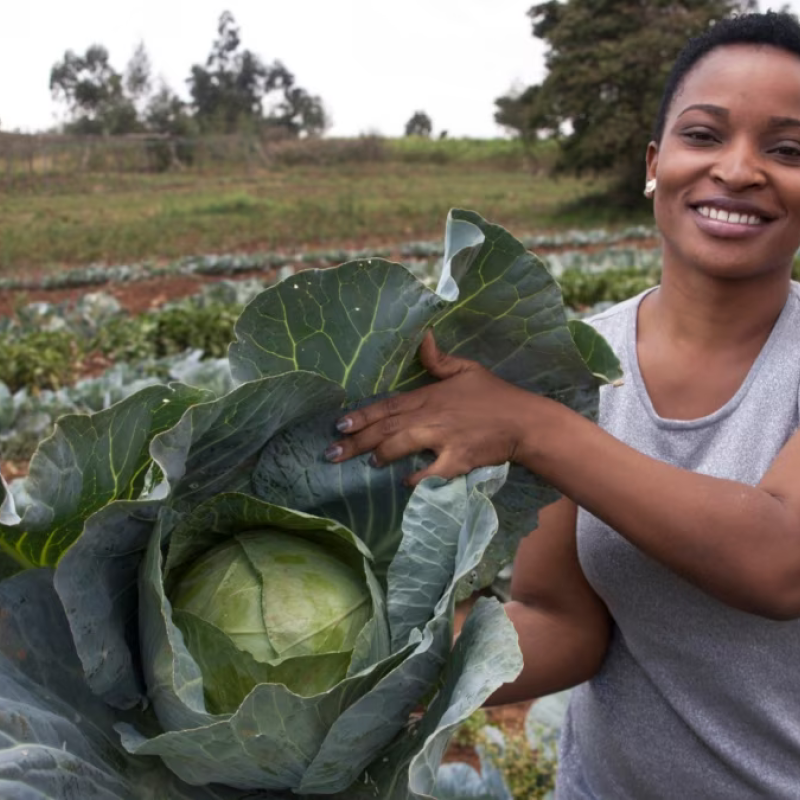
AAAP in the Media
Displaying 1 - 12 of 22
Staple Crops Processing Zone (SCPZ): funding proposal to the Green Climate Fund
The target countries of Democratic Republic of the Congo, Ethiopia, Togo and Zambia are regions experiencing high deforestation, poor agriculture yield and increasing poverty exacerbated by climate change. Across all four countries, climate variability and change has become a major threat to sustainable development.
As part of efforts to address these challenges, the four countries are implementing national projects to establish Staple Crops Processing Zones: initiatives designed to concentrate agro-processing activities within areas of high agricultural potential to boost productivity and integrate production, processing and marketing of selected commodities. These initiatives are purposely built shared facilities, to enable agricultural producers, processors, aggregators and distributors to operate in the same vicinity to reduce transaction costs and share business development services for increased productivity and competitiveness.
Developing adequate infrastructure (energy, water, roads, ICT) in rural areas of high agricultural potential should attract investments from private agro-industrialists/entrepreneurs to contribute to the economic and social development of rural areas.
The Staple Crops Processing Zone (SCPZ) development program aims to transform agriculture production in regions experiencing high deforestation, poor agriculture yield and increasing poverty exacerbated by climate change, including the target countries of Democratic Republic of the Congo, Ethiopia, Togo and Zambia.
The specific objectives of SCPZ are: (i) improving access to seed capital through grants and matching grants; (ii) supporting productivity enhancement through introduction of new technologies and agricultural inputs; (iii) improving access to infrastructure by supporting investment; (iv) improving the capacity of producer cooperative through training and TA, especially for targeted women and youth groups; (v) facilitating market linkages throughout-growers’ schemes; and (vi) facilitating on-farm value addition by targeting limited value chains and linking farmers to the supply chain.
GCF financing is sought to strengthen one of the project components of SCPZ in Democratic Republic of the Congo, Ethiopia, Togo and Zambia.
- Through the technical assistance program, AAAPwill accelerate the mobilization of adaptation finance.
- Increased carbon sinks in soil and above-ground biomass
- Reduced carbon dioxide/other greenhouse gas emissions from farms due to efficient energy use
- Increased renewable energy production from biomass, either as a substitute for fossil fuels or as a replacement for burning of fuel wood or crop residues
- Fewer incidents of bare soils, reduced soil erosion and increased water percolation.
- Reduced emissions through low-emission energy access and power generation
- Reduced emissions due to improved waste management, including by recycling waste and use of waste in biogas systems
- Reduction of emissions from land use and deforestation, and enhancement of forest carbon stocks.
-
Increased resilience, including to extreme events such as droughts and floods, and enhanced livelihood of about 55% of highly vulnerable people and communities
-
Increased access to better health and wellbeing, and food and water security to over 100,000 beneficiaries, in addition to provision of alternative sources of energy
-
Increased resilience of ecosystems and ecosystem services in forests and savannas
USD 427 million:
- Funding proposal to GCF seeking USD 174.02 million (USD 130.02 million grant and USD 44 million loan)
- AfDB providing USD 111.2 million (USD 85.2 million loan and USD 26 million grant)
- Co-financiers:
European Union, USD 10.4 million (grant)
BOAD, USD 17.6 million (loan)
Korea Exim Bank, USD 50 million (loan)
Korea Fund, USD 5 million (grant)
Islamic Development Bank, USD 31 million (loan)
Governments of target countries, USD 28 million (counterpart financing)
Adaptation Benefit Mechanism: Access to Climate Secure Safe Drinking Water
The Adaptation Benefit Mechanism (ABM) is an innovative mechanism for mobilising new and additional public and private sector finance for enhanced climate change adaptation action. It has the potential to speed up transformation to low-carbon, resilient and sustainable development of the host countries by giving value to resilience.
ABM will contribute directly to the establishment of a new business model for adaptation and the achievement of:
- The Sustainable Development Goals
- The Adaptation and Climate Finance goals of the Paris Agreement
- The UNFCCC long-term finance goal.
Adaptation and resilience goals and the needs of developing countries are expressed in, amongst others, Nationally Determined Contributions, National Adaptation Plans, Technology Action Plans and long-term strategies for low-emissions, resilient and sustainable development.
Madagascar is extremely vulnerable to climate extremes. The ABM will be used to mobilise funding to address damage to water sources caused by recent extreme events, such as Tropical Cyclone Emnati in February 2022.
This project will deliver a baseline and monitoring methodology in the public domain for quantified and verified adaptation benefits of climate change adaptation activities around access to climate secure and safe drinking water. The methodology will be applied in a funding proposal for a project in this area in Madagascar, where the issue has been prioritized due to damage to water sources from recent extreme events, including floods, droughts and extreme weather events.
- The added value is the GCA expertise in the water sector, adaptation metrics and indicators, as well as knowledge about resource mobilisation for adaptation and extensive network.
- Quality assurance and advisory services for results and evidence-based planning, management and M&E of the activities.
at least USD 1 million mobilized. It is expected would be replicable in the country and other regions, specifically in Africa.
- Skills developed and platform created to mobilize to resources for adaptation benefits.
- increased adaptation investments.
EUR 1 million
Can today’s Adaptation Action minimize future losses and damages in Africa?

On the sidelines of the 2022 edition of Africa Climate Week(link is external), a session titled Limiting Loss and Damage through Enhanced Adaptation Action in Africa featured vibrant and timely discussion of an aspect of climate change that typically receives little attention: capturing and assessing the costs and damages associated with climate change.
The African Development Bank and Germany’s Konrad Adenauer Foundation hosted the event, which provided a forum for panelists and participants to discuss the importance of defining and evaluating such losses and damages of properties, economies, lives and livelihoods due to climate disasters. Africa is acknowledged to be the continent most vulnerable to climate change.
Moderator Olufunso Somorin, a Regional Principal Officer at the African Development Bank, opened the discussion. He pointed out that it is important for African countries to measure climate-change related loss and damage to enable appropriate quantification and well-designed responses best suited to country context. It was also important to capture those losses occurred even in instances where preventive climate adaptation actions had been taken, he added.
Fatten Agad, Africa Climate Foundation’s Senior Advisor on Climate Diplomacy and Geopolitics, called for production of a report that would serve as guidance and baseline for evaluating climate related losses and damage. “It has already been demonstrated that the socio-economic impact faced by African countries in coping with the Covid-19 crisis has been very high, and adding a burden of financing something such as loss and damage would be unfair,” she said.
Anja Beretta, Konrad Adenauer’s Director for Energy Security and Climate Change in Africa, urged African countries to integrate mechanisms to address losses and damage into their Nationally Determined Contributions (NDCs). She also called for designated institutions and functioning structures to ensure the efficient and effective use of climate finance to advance the discussion on financial flows into loss and damage.
Stephane Bonamy, Head of the Regional Delegation for the International Committee of the Red Cross in Cameroon, said, for countries that face both conflict and climate change impacts, it is imperative that preventive measures are put in place early enough to reduce the extent of loss and damage faced and lessen the burden on communities.” He noted that 14 of the 25 most vulnerable countries to climate change impacts worldwide also face some form of conflict.
Dr Olumide Abimbola, the Executive Director of the Africa Policy Research Institute in Berlin reiterated the need for more African examples of past and current loss and damage to be incorporated into textbooks and journals.
There was agreement among the participants on the need for Africa to prioritize timely, comprehensive and large-scale adaptation action to avert or minimize future losses and damages.
There was also consensus on the urgent need to scale up financial flows from public and private sources into adaptation action across Africa. They cited the African Development Bank’s Africa Adaptation Acceleration Program, a joint initiative with the Global Center on Adaptation, as a positive example. The program seeks to mobilize $25 billion over five years to accelerate and scale climate adaptation actions across the continent.
Participants also called for new strategic partnerships to drive adaptation policies, plans and investments in Africa through the implementation of NDCs and tapping synergies with such initiatives as the Africa Disaster Risk Financing program.
About the African Climate Week (ACW)
ACW is an annual event that engages and empowers stakeholders to drive climate action across countries, communities and economies. The event is organized by UN Climate Change in collaboration with global partners UN Development Programme, UN Environment Programme and the World Bank Group. Partners in the region include the Africa Union, the Africa Development Bank, the UN Economic Commission for Africa (UNECA). ACW 2022 was hosted in Gabon.
State and Trends on Adaptation Report 2021: Africa
Adaption is crucial for the continent that is the most vulnerable to climate change, but adapting successfully will bring enormous benefits.
Climate risk regulation in Africa’s financial sector and related private sector initiatives
Extreme weather phenomena such as rising temperatures and the increasing frequency of droughts and floods are affecting lives and livelihoods in Africa. According to the Global Climate Risk Index 2021,1 five African countries ranked among the 10 countries most affected by extreme weather in 2019: Mozambique (first), Zimbabwe (second), Malawi (fifth), South Sudan (eighth), and Niger (ninth).
State and Trends in Adaptation Report 2022
A year on from State and Trends in Adaptation 2021 (STA21) which set out our blueprint for adaptation action, the evidence of the impact of deepening, growing climate change daily invades our screens.
2022 has seen record-breaking extreme weather globally, with mighty floods, vast wildfires, enduring heatwaves, and drought on every continent. More frequent and intense extreme weather and climaterelated events are creating new and increasing risks everywhere.

Africa Adaptation Acceleration Program Partnerships Forum
What: Africa Adaptation Acceleration Program Partnerships Forum
Who: African Development Bank and the Global Center on Adaptation
When: 27 October 2022, 15:00 GMT+2
Where: Windhoek, Namibia (Hybrid format)
The African Development Bank and the Global Center on Adaptation, with the support of partners are convening the Africa Adaptation Acceleration Program (AAAP) Partnerships Forum at the 10th Conference on Climate Change and Development in Africa. This will take place on 27th October 2022 in Windhoek, Namibia.
The Forum invites partners to showcase their adaptation work in Africa, align and seek opportunities for scaling up their activity, and raise awareness of relevant initiatives being implemented, connected to the four thematic pillars of the AAAP.
The Forum, to be organized in hybrid format, is designed as an interactive dialogue with participants from public institutions, regional and international organizations, financial institutions, research institutions and academia. The private sector, non-governmental organizations, civil society, and young people will also be represented.
The Forum will provide opportunities for new connections and inputs. It also aims to learn from partners, share innovative approaches and provide an update on AAAP programs and projects.
Register here to join the Africa Adaptation Acceleration Program Partnerships Forum online.
20 young African entrepreneurs bag $100,000 each to boost their climate adaptation businesses
Digital Climate Adaptation Solutions Training – Southern Africa
Harnessing the power of technological innovations and digitalization to improve agricultural productivity and strengthen climate resilience has been recognized as one of the potential game changers to address many of pressing climate concerns and rural transformation challenges facing Africa today.
Digital climate-informed advisory services are tools and platforms that integrate climate information into agricultural decision-making. These services range from digital mobile apps, radio, and online platforms to digitally enabled printed bulletins based on climate models and extension services that utilize climate information platforms. DCAS offers crucial opportunities to build the resilience of small-scale producers in the face of worsening climate change impacts, particularly when bundled with complementary services (such as financing, input supply, market access, insurance).
The objectives of the DCAS trainings are as follows:
- Capacity enhancement for agricultural stakeholders across Southern Africa in DCAS
- Supporting trainees to improve their confidence and capacity to design and implement DCAS projects to reach the last mile and farmers for improved food security and climate resilience
- Facilitating knowledge/experience sharing of participants on contextual issues and approaches to scale up DCAS
- Increase the knowledge of stakeholders from across Southern Africa on opportunities and new approaches for the design, mainstreaming and use of digital tools and data-enabled agriculture to combat the effects of climate change
- enhancing capacity to use digital agriculture advisory services and solutions to ensure uptake by of DCAS among stakeholders in Southern Africa
- Over 50 Participants trained in digital agriculture and digital climate adaptation solutions
- A new cohort or platform of African public officials, researchers, farmers organizations leaders and agricultural NGO focal points with improved expertise in DCAS (for subsequent experience capitalization follow up and training)
- Training evaluation assessment report
- Improved understanding / knowledge of target stakeholders in Southern Africa through training and information sharing including lessons learned on the challenges, opportunities and new approaches to the design, mainstreaming and use of DCAS and data-enabled agriculture
- Enhanced capacity of selected agricultural stakeholders in public institutions and farmers groups across Southern Africa to use digital agriculture advisory solutions, implement digital climate smart advisory solutions, and train their members/colleagues to use DCAS tools
€100,000
Antanarivo city climate stress test
Currently, Africa’s infrastructure needs are around USD 130–170 billion a year, with an investment gap of over 50–60% of that amount. Making Africa’s infrastructure resilient adds only an average of 3% to total costs, but every $1 spent could yield $4 of benefits.
The Africa Infrastructure Resilience Accelerator (Pillar 2 of the Africa Adaptation Acceleration Program (AAAP)) focuses on accelerating infrastructure resilience efforts on the continent. It will strengthen the enabling environment and provide the technical support to scale up investment in resilient infrastructure. It will also ensure that new and existing infrastructure uses nature-based solutions and create positive socioeconomic impacts and green jobs. By 2025, Pillar 2 of the AAAP aims to scale up investment at national and city level for climate-resilient infrastructure in key sectors such as water, transport, energy, and waste management, and integrate resilience in up to 50% (by value) of new infrastructure projects.
The City Adaption Accelerators (CAAs) are carrying out Rapid Climate Risk Assessments in target cities, which aim to improve climate adaptation and build resilience in urban areas.
The primary purpose of the RCRAs is to inform the identification and preparation of AfDB projects.
The RCRAs will inform the development of a comprehensive climate adaptation strategy and prioritization plan and are a crucial step towards the development of the CAA for each of the target cities. The overarching objective of the CAA is to create a shared strategic framework for GCA’s engagement in climate adaptation and resilience building in urban areas. The development objective of the CAA is to support cities and countries to strengthen their urban climate adaptation and resilience outcomes through enhanced (1) understanding; (2) planning; (3) investments; and (4) governance and capacity building.
- Outputs will inform future discussions surrounding climate adaptation investments
- GCA is demonstrating its unique value add in its ability to provide technical guidance to firms towards developing well-informed analyses
- Literature review of vulnerability and adaptive capacity assessments of cities to climate change
- Scoping of past and current initiatives and key stakeholders relevant for adaptation and resilience building in cities
- City Scan: rapid review of actions around climate hazard and risk assessments and more locally focused assessments of vulnerability and adaptive capacity
- Rapid Climate Risk Assessment: an overview of the key climate hazards and associated risks; will indicate whether an in-depth climate risk assessment is required
- City Scoping: provides insight into past and current initiatives relevant for adaptation and resilience building and identifies key stakeholders and relevant initiatives
As part of the CAA, the RCRAs will contribute to the following impacts:
- Strengthened urban climate risk management in cities and their hinterlands
- Improved climate adaptive spatial planning at the municipal and regional levels
- Enhanced water resources management for more equitable access to ecosystem benefits
- Enhanced resilience, consistency, inclusiveness and integration of urban drinking water, sanitation and solid waste management services
- Improved urban liveability and public health due to a reduction in climate risks stemming from heat stress and disease
€40,000


